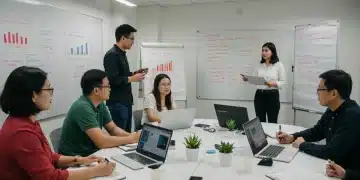Digital literacy programs for seniors: empowering lives

Digital literacy programs for seniors enhance their technology skills, improve social connections, and foster independence by providing tailored resources and supportive learning environments.
Digital literacy programs for seniors are transforming the way older adults connect with technology and the world around them. Have you ever wondered how these programs make a difference in their daily lives? Let’s explore the impact they can have.
Understanding digital literacy
Understanding digital literacy is crucial for seniors. This concept refers to the ability to effectively and critically navigate, evaluate, and create information using digital technologies. As our world becomes more digital, it is essential for older adults to become familiar with these tools to stay connected and informed.
Many seniors may feel overwhelmed by technology, but understanding digital literacy can change that perception. This promotes not only personal growth but also enhances social interaction.
Key Components of Digital Literacy
There are several important aspects that seniors should focus on as they learn about digital literacy.
- Device familiarity: Understanding how to use smartphones, tablets, and computers is the first step.
- Internet navigation: Learning how to search for information online and evaluate its credibility.
- Online communication: Mastering tools such as email and social media helps maintain connections with family and friends.
- Safety and privacy: Knowing how to protect personal information online is essential.
A comprehensive approach to digital literacy will not only equip seniors with necessary skills but also build their confidence. Engaging in workshops and community programs can further enhance this learning process. As seniors become more comfortable with technology, they will notice that it can open up a world of resources, entertainment, and social opportunities.
In conclusion, understanding digital literacy is a stepping stone for seniors to thrive in today’s digital age. By focusing on key components and participating in supportive programs, they can enhance their everyday lives significantly.
Benefits of digital literacy for seniors
Understanding the benefits of digital literacy for seniors is essential. These programs empower older adults to navigate technology confidently. With the right skills, seniors can enhance their quality of life significantly.
One major benefit is improved communication. Seniors who learn how to use email and social media can stay connected with family and friends. This connection helps combat feelings of isolation. Whether it’s sharing photos or sending messages, technology has the power to bring loved ones closer together.
Access to Information
Digital literacy also provides seniors with easier access to information. They can look up topics of interest, find local services, and even enjoy online courses. This capability promotes lifelong learning and allows them to stay informed about important issues.
- Health resources: Seniors can book medical appointments online and access health information.
- News updates: Staying updated with current events is easier when using the internet.
- Online shopping: Learning to shop online can make life more convenient.
- Hobby exploration: Discovering new hobbies is a click away.
Another significant advantage is increased independence. As seniors become proficient in technology, they can accomplish tasks without relying on others. This independence fosters self-confidence and helps them feel capable in an increasingly digital world.
Furthermore, digital literacy can boost cognitive skills. Learning new technologies encourages problem-solving, critical thinking, and adaptability. Engaging with digital platforms keeps the mind active and can contribute to better mental health.
How to engage seniors in programs

Engaging seniors in digital literacy programs can be rewarding and fun. It involves using creative strategies to capture their interest. Understanding their needs and preferences is essential for success.
First, creating a welcoming environment encourages participation. Seniors should feel comfortable and valued in these programs. Simple things like friendly staff, bright spaces, and positive energy can make a big difference.
Interactive Learning Approaches
Utilizing interactive methods can enhance engagement significantly. Rather than just lectures, incorporating hands-on activities allows seniors to practice skills in real time.
- Group activities: Working in small groups fosters collaboration and socialization.
- Games and challenges: Friendly competitions can make learning enjoyable and less intimidating.
- Peer mentoring: Pairing tech-savvy seniors with those who need more help can strengthen community bonds.
- Flexible scheduling: Offering classes at various times accommodates different lifestyles.
Adapting the content to fit their interests is also crucial. For instance, if many seniors enjoy photography, teaching them how to use digital cameras or smartphones to take and edit photos can be exciting and relevant. This tailored approach makes the learning experience more applicable and enjoyable.
Moreover, providing ongoing support is vital. Having follow-up sessions or creating online groups helps reinforce the skills learned. Seniors should know that help is always available.
Establishing a community feel can encourage more participation. Hosting social events at the end of each program can create a bonding experience. When seniors feel connected, they are more likely to engage and continue learning.
Tools and resources available
There are many tools and resources available to support seniors in their journey to improve digital literacy. These resources can make learning easier and more accessible. Understanding and using them can greatly enhance the overall experience.
Firstly, local libraries often offer free access to technology classes. These classes are designed specifically for seniors, providing a comfortable learning environment. Many libraries also have computers available for use, making it convenient for seniors who do not have their own devices.
Online Learning Platforms
Another excellent resource is online learning platforms. Websites like Coursera, Khan Academy, and YouTube provide numerous tutorials and courses focused on digital skills. These platforms are user-friendly and allow seniors to learn at their own pace.
- Coursera: Offers a wide range of classes, including basic computer skills and internet navigation.
- LinkedIn Learning: Provides short video tutorials on various topics, from social media to using specific software.
- YouTube: A treasure trove of instructional videos, with content on almost any digital topic imaginable.
- SeniorNet: An organization dedicated to teaching seniors how to use technology.
In addition to these platforms, there are specific apps designed for seniors to help them stay connected and navigate technology. Applications such as Zoom for video calls, WhatsApp for messaging, and even Facebook can greatly enhance social interactions.
Moreover, community centers often host workshops and seminars to introduce seniors to new technologies. They are not only informative but also foster social connections among participants. Joining these workshops can provide practical experience and encourage collaboration.
Lastly, online forums and communities can be valuable. Websites that offer support and troubleshooting advice allow seniors to connect with others who have similar technology questions. These forums create a sense of belonging while also providing solutions to common tech problems.
Success stories from local communities
Highlighting success stories from local communities can inspire and motivate seniors to engage in digital literacy programs. These stories showcase real-life experiences, demonstrating the positive impacts of learning new skills.
For instance, a community center in a small town organized weekly classes for seniors to learn basic computer skills. Many participants reported feeling more confident in using technology. One participant, Mrs. Johnson, shared that after learning to use email and video chat, she was able to reconnect with her grandchildren living abroad. This not only strengthened family bonds but also improved her overall happiness.
Community Partnerships
Successful programs often involve collaboration with local businesses and organizations. For example, a partnership between a library and a local tech company provided free tablets to seniors who completed a digital literacy course. This initiative allowed older adults to continue practicing their skills at home.
- Local businesses: Collaborating with nearby shops can provide resources and incentives for participation.
- Volunteer mentors: Connecting seniors with tech-savvy volunteers creates a nurturing learning environment.
- Community events: Hosting events highlighting success stories encourages others to join.
- Workshops: Offering hands-on workshops can give seniors the confidence they need to use technology.
Another inspiring story comes from a retirement community that launched a monthly tech day. Residents help each other troubleshoot issues and share tips. This not only fosters collaboration but also builds friendships. Through these interactions, many seniors reported a better understanding of technology and an increase in their social life.
Sharing these success stories is essential in motivating others to participate. When seniors see their peers thriving and gaining confidence in using technology, they may feel more encouraged to join classes and workshops.
FAQ – Frequently Asked Questions about Digital Literacy Programs for Seniors
What are digital literacy programs?
Digital literacy programs are designed to teach seniors how to use technology effectively, including the use of computers, smartphones, and the internet.
How can these programs benefit seniors?
These programs help seniors improve their communication, access information, and maintain independence, enhancing their overall quality of life.
Where can seniors find resources for digital literacy?
Seniors can find resources at local libraries, community centers, and online platforms that offer courses tailored for older adults.
Can seniors learn at their own pace?
Yes, many programs offer flexible learning options, allowing seniors to progress at their own speed and revisit materials as needed.





